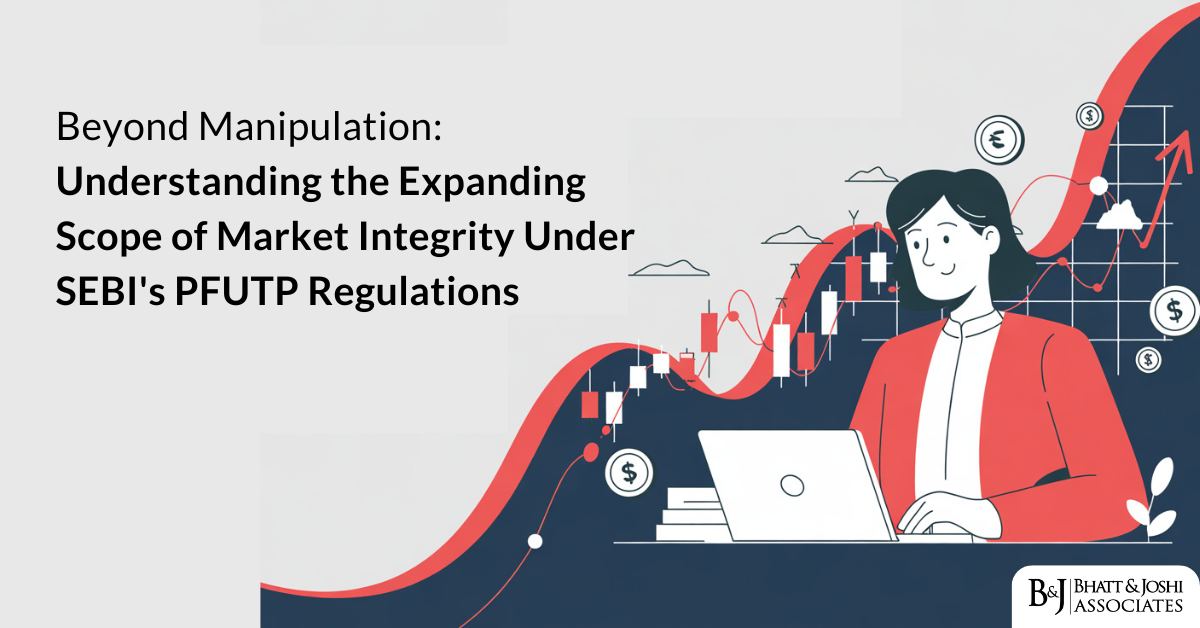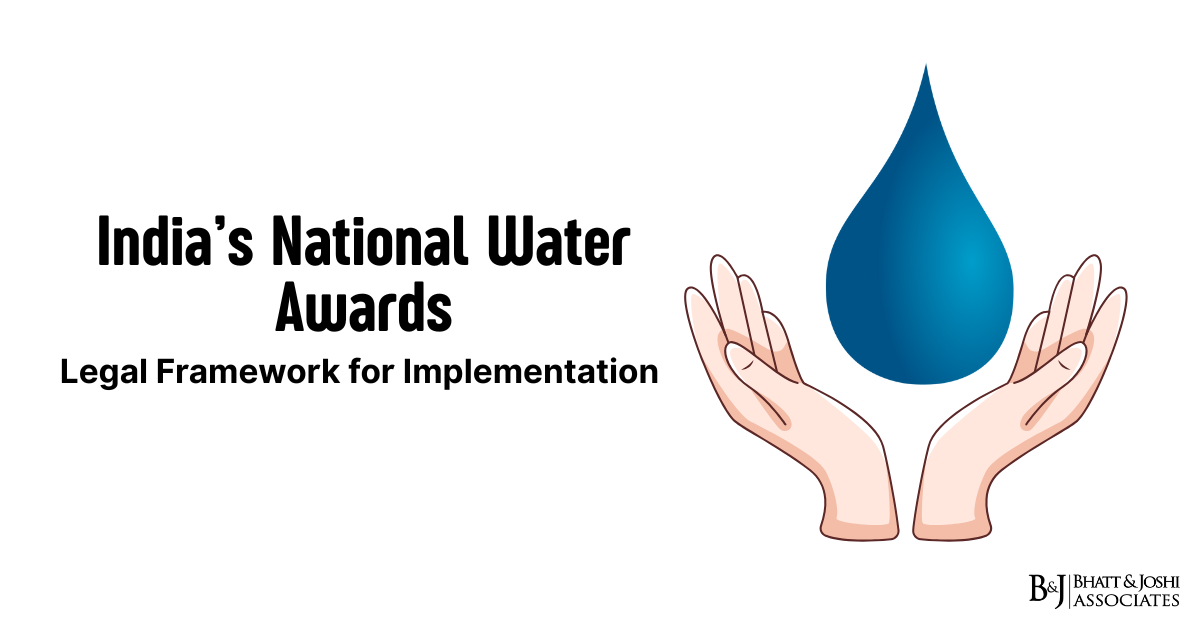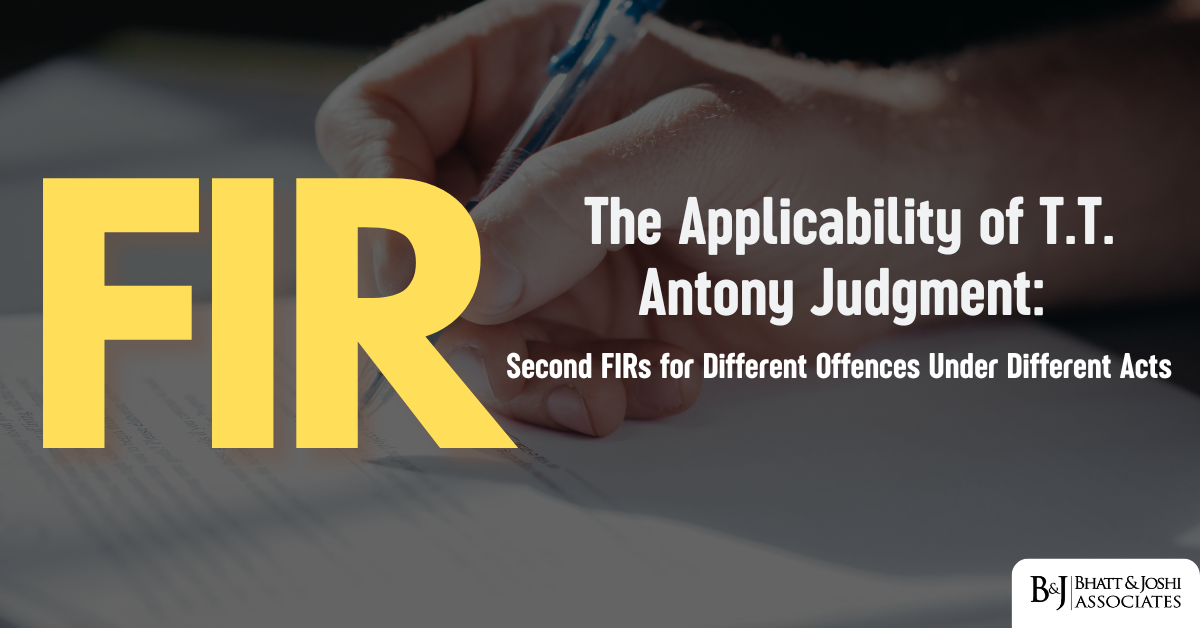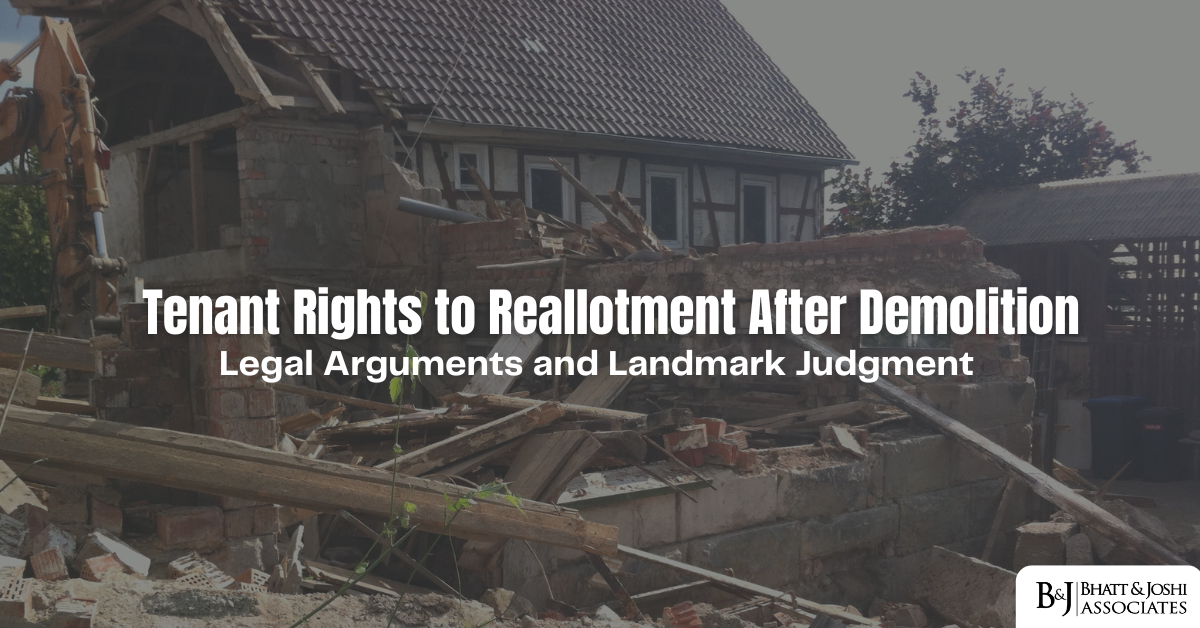Authored by: Aaditya Bhatt, Advocate
Bhatt & Joshi Associates
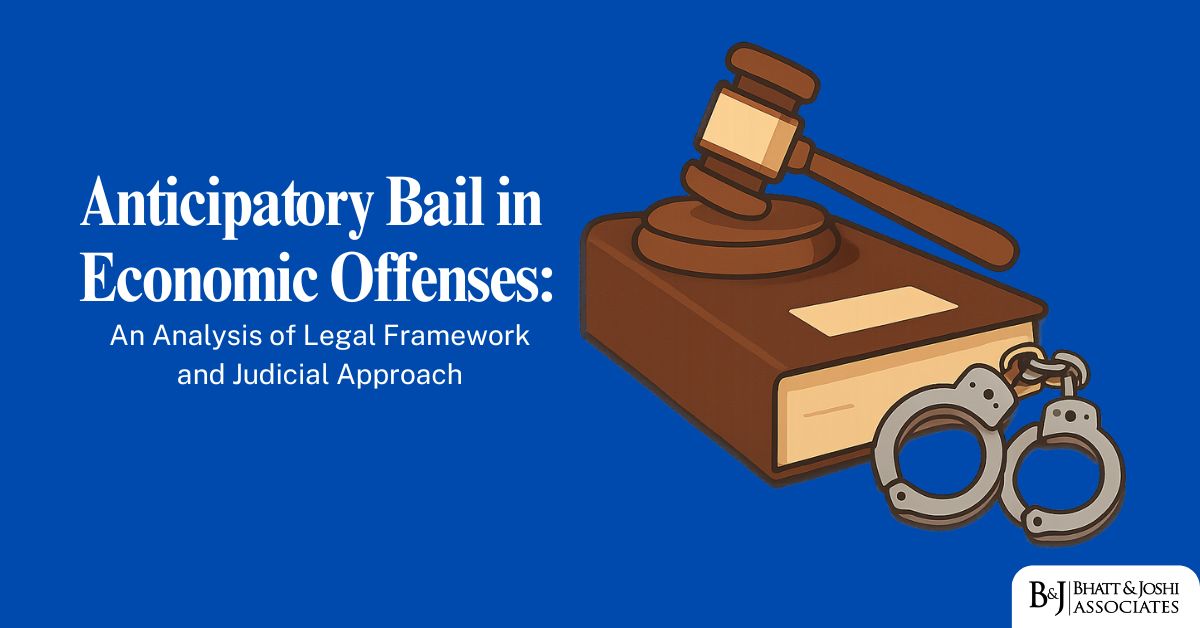
Introduction
The landscape of anticipatory bail in economic offenses has undergone significant evolution through judicial pronouncements over the years. The Supreme Court of India has consistently emphasized that economic offenses constitute a different class altogether due to their impact on the financial fabric of society. A recent Supreme Court judgment in Serious Fraud Investigation Office (SFIO) vs. Aditya Sarda (2025) has further solidified this position while clarifying the stringent conditions for granting anticipatory bail in cases involving fraud under the Companies Act. This article analyzes the legal framework governing anticipatory bail in economic offenses and explores the judicial approach through landmark judgments.
Legal Framework for Anticipatory Bail in Economic Offenses
General Provisions Under Section 438 of CrPC
Section 438 of the Criminal Procedure Code (CrPC) provides the power to grant anticipatory bail to the High Court and Sessions Court. While this provision is meant to protect individuals from unwarranted arrest, the courts have consistently held that this power should be exercised sparingly, particularly in cases of serious economic offenses.
In SFIO vs. Aditya Sarda (2025), the Supreme Court quoted from P. Chidambaram vs. Directorate of Enforcement (2019) to highlight the exceptional nature of anticipatory bail:
“Power under Section 438 CrPC is an extraordinary power and the same has to be exercised sparingly. The privilege of the pre-arrest bail should be granted only in exceptional cases.”
The Court further elaborated on the relationship between anticipatory bail and economic offenses:
“Economic offenses stand as a different class as they affect the economic fabric of the society. In economic offenses, the accused is not entitled to anticipatory bail.”
Special Provisions Under Companies Act, 2013
The Companies Act, 2013 introduces special provisions regarding bail for certain offenses, particularly those involving fraud. Section 212 of the Act deals with investigation into affairs of a company by the Serious Fraud Investigation Office (SFIO), and subsection (6) lays down specific conditions for bail in cases involving Section 447 (punishment for fraud).
As reproduced in the SFIO vs. Aditya Sarda judgment, Section 212(6) states:
“Notwithstanding anything contained in the Code of Criminal Procedure, 1973 (2 of 1974), offence covered under section 447 of this Act shall be cognizable and no person accused of any offence under those sections shall be released on bail or on his own bond unless-
(i) the Public Prosecutor has been given an opportunity to oppose the application for such release; and
(ii) where the Public Prosecutor opposes the application, the court is satisfied that there are reasonable grounds for believing that he is not guilty of such offence and that he is not likely to commit any offence while on bail.”
Twin Conditions for Bail in Fraud Cases
The Supreme Court in SFIO vs. Aditya Sarda referred to these as “twin conditions” that are “mandatory in nature.” The Court held that these conditions apply even to anticipatory bail proceedings, citing the three-judge bench decision in Vijay Madanlal Choudhary and Others vs. Union of India and Others (2023), which examined similar provisions under the PMLA.
The significance of Section 447 of the Companies Act lies in its comprehensive definition of fraud and stringent punishment. As per this section:
“Without prejudice to any liability including repayment of any debt under this Act or any other law for the time being in force, any person who is found to be guilty of fraud, involving an amount of at least ten lakh rupees or one per cent. of the turnover of the company, whichever is lower shall be punishable with imprisonment for a term which shall not be less than six months but which may extend to ten years and shall also be liable to fine which shall not be less than the amount involved in the fraud, but which may extend to three times the amount involved in the fraud.”
Judicial Approach to Anticipatory Bail in Economic Offenses
Supreme Court’s Consistent Stance
The Supreme Court has consistently maintained a firm stance on anticipatory bail in economic offenses. In SFIO vs. Aditya Sarda, the Court referenced several previous judgments that establish this position.
Quoting from Y.S. Jagan Mohan Reddy vs. Central Bureau of Investigation (2013), the Court reiterated:
“Economic offences constitute a class apart and need to be visited with a different approach in the matter of bail. The economic offences having deep-rooted conspiracies and involving huge loss of public funds need to be viewed seriously and considered as grave offences affecting the economy of the country as a whole and thereby posing serious threat to the financial health of the country.”
The Court further cited Nimmagadda Prasad vs. Central Bureau of Investigation (2013):
“Unfortunately, in the last few years, the country has been seeing an alarming rise in white-collar crimes, which has affected the fibre of the country’s economic structure. Incontrovertibly, economic offences have serious repercussions on the development of the country as a whole.”
Analysis of SFIO vs. Aditya Sarda (2025)
The SFIO vs. Aditya Sarda case involved allegations of serious fraud where the Adarsh Credit Cooperative Society Limited, managed by Mukesh Modi and his family, had allegedly siphoned off funds to the tune of Rs. 1700 crores through illegal loans to approximately 70 companies controlled by them.
The Court analyzed the conduct of the respondents-accused who had avoided execution of non-bailable warrants even after their anticipatory bail applications were rejected by the Special Court. The Supreme Court observed:
“It cannot be gainsaid that the judicial time of every court, even of Magistrate’s Court is as precious and valuable as that of the High Courts and the Supreme Court. The accused are duty bound to cooperate the trial courts in proceeding further with the cases and bound to remain present in the Court as and when required by the Court. Not allowing the Courts to proceed further with the cases by avoiding execution of summons or warrants, disobeying the orders of the Court, and trying to delay the proceedings by hook or crook, would certainly amount to interfering with and causing obstruction in the administration of justice.”
Key Principles Established
The Supreme Court in SFIO vs. Aditya Sarda established or reinforced several key principles:
- Special Treatment for Economic Offenses: Economic offenses constitute a class apart because they affect the economic fabric of society and pose serious threats to the financial health of the country.
- Mandatory Twin Conditions: The twin conditions specified in Section 212(6) of the Companies Act are mandatory and apply even to anticipatory bail proceedings.
- Conduct of the Accused: The conduct of the accused in evading legal process can be a determinative factor in denying anticipatory bail.
- Proclamation Proceedings and Anticipatory Bail: When a warrant of arrest is issued or proclamation proceedings are initiated, the accused is not entitled to invoke the extraordinary power of anticipatory bail except in exceptional cases.
The Court emphatically stated:
“When warrant of arrest is issued or proclamation proceedings are initiated, the accused would not be entitled to invoke, except in exceptional cases, the extraordinary power of the court to grant anticipatory bail. Granting anticipatory bail is certainly not the rule. The respondents-accused, who have continuously avoided to follow the due process of law, by avoiding attendance in the Court, by concealing themselves and thereby attempting to derail the proceedings, would not be entitled to the anticipatory bail.”
Procedural Aspects in Economic Offenses Case
Issuance of Warrants: Bailable vs. Non-bailable
The judgment in SFIO vs. Aditya Sarda provides valuable insights into the procedural aspects of issuing warrants in economic offense cases. Section 204 of CrPC gives the court taking cognizance of an offense the discretion to issue either a warrant or summons in warrant cases.
The Court referred to Inder Mohan Goswami and Another vs. State of Uttaranchal and Others (2007) to explain when non-bailable warrants should be issued:
“Non-bailable warrant should be issued to bring a person to court when summons or bailable warrants would be unlikely to have the desired result. This could be when:
- it is reasonable to believe that the person will not voluntarily appear in court; or
- the police authorities are unable to find the person to serve him with a summon; or
- it is considered that the person could harm someone if not placed into custody immediately.”
The Court clarified that there cannot be a “strait jacket formula” for issuing summons versus warrants:
“There cannot be a strait jacket formula, as sought to be submitted by the learned advocates for the Respondents that the Court must first issue a summons even in case of a warrant case, irrespective of the gravity or seriousness of the offence.”
Proclamation Proceedings Against Absconding Accused
When an accused person deliberately avoids appearing before the court, Section 82 of CrPC allows the court to initiate proclamation proceedings. As reproduced in the judgment:
“If any Court has reason to believe (whether after taking evidence or not) that any person against whom a warrant has been issued by it has absconded or is concealing himself so that such warrant cannot be executed, such Court may publish a written proclamation requiring him to appear at a specified place and at a specified time not less than thirty days from the date of publishing such proclamation.”
In SFIO vs. Aditya Sarda, the Court endorsed the Special Court’s decision to initiate proclamation proceedings against the respondents who had been avoiding the execution of warrants.
Conduct of Accused and Its Relevance to Bail
A significant aspect of the judgment is the emphasis on the conduct of the accused in determining bail applications. The Court noted:
“If the Rule of Law is to prevail in the society, every person would have to abide by the law, respect the law and follow the due process of law.”
The Court firmly rejected the argument that if the respondents were not arrested during investigation, only summons should have been issued:
“Whether the attendance of the accused can be best secured by issuing a bailable warrant or non-bailable warrant, would be a matter, which entirely rests at the discretion of the concerned Court. Although the discretion should be exercised judiciously, diverse considerations such as the nature and seriousness of the offence, the circumstances peculiar to the accused, possibility of his concealing or absconding, larger interest of public and state etc. also must be seriously considered by the court.”
Other Significant Cases on Similar Legal Points
P. Chidambaram vs. Directorate of Enforcement (2019)
In this landmark case, the Supreme Court extensively discussed the principle that anticipatory bail should not be granted as a matter of routine, particularly in serious economic offenses. The Court observed:
“A delicate balance is required to be established between the two rights-safeguarding the personal liberty of an individual and the societal interest.”
The Court emphasized that refusal to grant anticipatory bail would not amount to a denial of rights under Article 21 of the Constitution, especially in economic offenses.
Srikant Upadhyay and Others vs. State of Bihar (2024)
In this recent case, the Supreme Court made pertinent observations about the power to grant anticipatory bail under Section 438 of CrPC:
“The power to grant anticipatory bail is an extraordinary power. Though in many cases it was held that bail is said to be a rule, it cannot, by any stretch of imagination, be said that anticipatory bail is the rule. It cannot be the rule and the question of its grant should be left to the cautious and judicious discretion by the Court depending on the facts and circumstances of each case.”
Prem Shankar Prasad vs. State of Bihar (2024)
This case specifically dealt with the issue of granting anticipatory bail when proclamation proceedings had been initiated. The Court disapproved of granting anticipatory bail while ignoring the proceedings under Sections 82/83 CrPC:
“Thus, the High Court has committed an error in granting anticipatory bail to Respondent 2-accused ignoring the proceedings under Sections 82/83 CrPC.”
Conclusion
The judgment in SFIO vs. Aditya Sarda (2025) reinforces the Supreme Court’s consistent stance that economic offenses require special consideration due to their impact on society and the economy. The Court has clearly established that the twin conditions under Section 212(6) of the Companies Act are mandatory for granting bail in cases involving fraud under Section 447, even for anticipatory bail applications.
The Court has also emphasized that when accused persons deliberately avoid court proceedings by concealing themselves or not making themselves available for the execution of summons or warrants, they forfeit their right to anticipatory bail. The rule of law demands that every person abide by the law and follow due process.
This judgment adds to the growing body of jurisprudence that recognizes the gravity of economic offenses and establishes stringent standards for granting bail in such cases. It underscores the need for courts to balance individual liberty with societal interest, particularly when dealing with offenses that impact the financial health of the nation.
By setting clear guidelines for the exercise of discretion in granting anticipatory bail in economic offense cases, the Supreme Court has provided valuable guidance to lower courts and reinforced the principle that the law aids only those who abide by it, not those who resist it.





